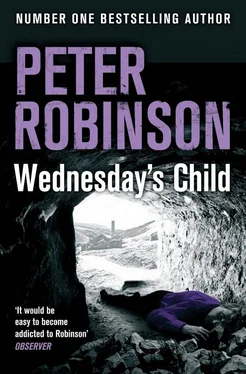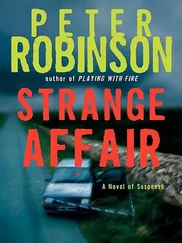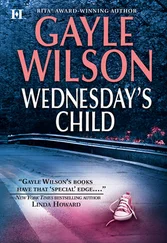Banks stared at the polished silver. “The goblet?”
“Yes. It’s a chalice actually, sixteenth-century, I think. Remember when Phil and Susan took me into Harkness’s living-room and laid me on the couch till the ambulance came? That’s when I noticed it. I could hardly miss it, it was right at eye-level.”
“I still don’t see what that’s got to do with Gemma,” said Banks, who was beginning to worry that Gristhorpe was more seriously injured than he let on.
“Don’t you?” Gristhorpe passed him the chalice. “See those markings?”
Banks examined it. “Yes.”
“It’s the banner of the Pilgrimage of Grace. See where it shows the five wounds of Christ? I’ll explain it, then you can go see if I’m right.”
Puzzled, Banks crossed his legs and leaned back in his chair.
It was late twilight as Banks drove: the time of evening when the greens of the hillsides and the grey of the limestone houses and walls are all just shades of darkness. But the river seemed to glow with a light of its own, hoarded from the day, as it snaked through the wooded river meadows known as The Leas.
As he drove, Banks remembered Gristhorpe’s words: “In Yorkshire history, The Pilgrimage of Grace started as a religious uprising against Henry VIII, sparked by the closing of the monasteries in 1536. Harkness’s house was built later, so this chalice would probably be a precious family heirloom and a powerful symbol to whoever owned it. In the seventeenth century, it was often dangerous to be a Roman Catholic in this part of the country, but they persisted. They didn’t take unnecessary risks, though. So while they would invite some wandering incognito priest around to perform mass or take confession in their houses, they knew they might hear the soldiers hammering on the door at any moment, so they built priest holes, cavities in the walls where the priests could hide. Some were even more elaborate than that. They led to underground passages and escape routes.
“I grew up in Lyndgarth, just up the hill from Harkness’s,” Gristhorpe had continued, “and when we were kids there were always rumours about the old De Montfort house, as it was called then. We thought it was haunted, riddled with secret passages. You know how kids dream. We never went inside, of course, but we made up stories about it. I’d forgotten all about it until we went there tonight — and I must admit things happened quickly enough to put it right out of my mind again. Until I saw this chalice. It started me thinking. The date’s right, the history, so it’s worth a try, don’t you think?”
Banks had agreed. He turned into the drive and stopped at the police tape. The man on duty came forward, and when he recognized Banks he let him through.
Banks nodded greetings as he passed the SOCO team at work in the garden, receiving shakes of the head to indicate that nothing new had been discovered. The grounds looked like a film set, with the bright arc-lights casting shadows of men digging, and it was loud with the sound of drills, the humming of the generator van and instructions shouted above the noise. Inside the house, men examined the corners of carpets and settees, sticking on pieces of Sellotape and lifting off fibres, or running over areas with compact hand-vacuums.
First, Banks checked the kitchen, behind the fridge and cooker, then the dining-room, getting help to move out the huge antique cabinet that held cutlery and crystal glasses. Nothing.
The library yielded nothing either, so he went next to the living-room, where he had first noticed the grimy, tarnished chalice on the coffee-table. It was partly seeing it again and noticing how clean it was that had first made him uneasy earlier that day, on his visit with Susan.
The bookcase opposite the fireplace looked promising, and Banks started pulling out the old National Geographics, looking for some kind of lever or button to press, and feeling, as he did so, more than a little foolish. It was like something out of Edgar Allan Poe, he thought.
Then he found it: a brass bolt sunk perfectly in the wood at the back of the central shelf, on the left. It slid back smoothly, as if recently oiled, and the whole bookcase swung away from the wall on hinges, just like a door. Before him loomed a dark opening with a flight of worn stone steps leading down.
Banks called for a torch, and when he had one, he stepped into the opening. On a hook to his left hung two keys on a ring. He plucked them off as he went by.
At the bottom of the stairs, a rough, dank passage led on, probably far away from the house to provide an escape for the itinerant priest. Banks shone his torch ahead and noticed that the passage was blocked by rubble after a few yards. But the two heavy wooden doors, one on either side of the passage, looked more interesting. Banks went to the one on his right and tried to open it. It was locked. Holding his breath, heart pounding, he tried the keys. The second one worked.
The hinges creaked a little as he slowly pushed the door open. Groping in the dark, he found a light switch, and a bare bulb came on, revealing a small, square room with whitewashed walls. At the centre of the room stood a leather armchair, the kind with a footrest that slides out as you sit in it, and in front of that stood a television set attached to a video. Banks doubted that priest holes had electricity, so Harkness must have gone to all the trouble of wiring his private den himself. In a rack beside the chair, Banks found a range of pornographic magazines, all of them featuring children being subjected to disgusting and degrading acts. In the cabinet under the video were a number of video cassettes of a similar nature.
Afraid of what he might find, Banks crossed the passage and fitted the other key in the lock. It opened easily. This time, he had no need to grope for a light switch. Beside the narrow bed stood a small orange-shaded table-lamp. Next to it sat a book of Thomas the Tank Engine stories and a bottle of pills. The walls were painted with the same whitewash as the other room, but a quilt decorated with stylized jungle animals — lions, tigers and leopards with friendly human expressions — covered the small, still shape on the bed.
It was Gemma Scupham, no doubt about it. From what Banks could see of her face between the dirty patches, it looked white, and she lay motionless on her back, her right arm raised above her head. The scar of a thin cut ran across the pale flesh of her inner arm.
Banks could sense no breath, no life. He bent over to look more closely. As he leaned over Gemma, he fancied he noticed one of her eyelids twitch. He froze. It happened again.
“My God,” he muttered to himself, and gazed down in awe as a tear formed and rolled out of the corner of Gemma’s eye, leaving a clean and shining path through the grime.












